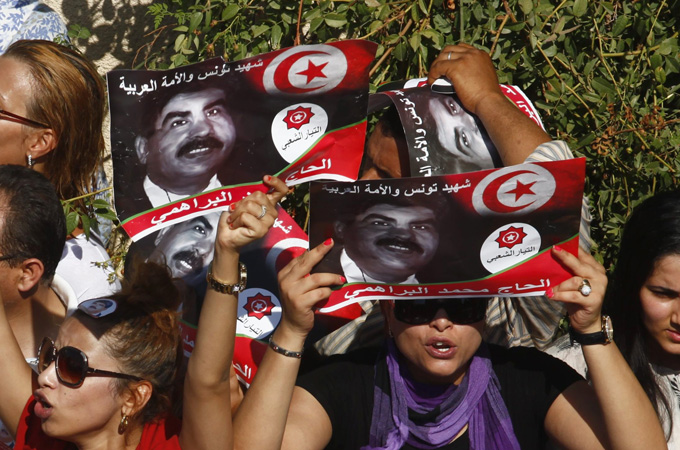Tunisia might become the world's next Afghanistan.
Al-Jazeera

"Since 2011, Tunisia and Algeria's relations have been less than optimal," writes Larbi Sadiki [Reuters]
|
"The protest in front of the National Constituent Assembly (NCA) flared up with lights, tension, anxiety and defiance soon after the demonstrators learnted of the ambush that killed nine soldiers in Tunisia's North-western border with Algeria in the Chaambi Mount. It has been a bloody week for the Arab Spring states, specifically for Egypt, Libya and Tunisia. In Tunisia, still adamant to push on with democratisation while ideological polarisation is widening, the latest killings comes days after the assassination of leftist politician Mohamed Brahmi. Afghanistan-isation? Since 2011, Tunisia and Algeria's relations have been less than optimal. The time has come for the two to work jointly on a chronic problem that neither can curb without internal collaboration; neighbouring and international efforts must also step up surveillance and security operations. Obviously the Chaambi, Le kef and Kasserine areas still have Salafist and al-Qaeda terrorists. Tunisian security forces are now fighting more than one al-Qaeda franchise group, including the Uqba ibn Nafi Brigade (UINB). These groups are tightening the noose on Tunisia and, judging by the large quantities of weapons confiscated (including from Libya), Tunisia may be the focus of the terrorist organisations. As far as Tunisia is concerned, the weakness of the country's security forces may mean that Ansar Al-Shari'ah, UINB, and AQIM may be indeed itching for a head-on fight with the Tunisian state at a time of disarray, weak intelligence on the ground, heightened political polarisation and disaffected areas around Chaambi, Kasserine etc. being outside the reach of state authority - as if parallel authority is emerging in these areas, which is not yet the case. There will now be a call to ban Tunisia's Salafists, go hard on their preaching activities altogether. It will be a huge challenge to Nahda, the ruling political party, which has so far chosen not to open up a front on which to confront the Salafist group. Abu Iyadh and other Salafist leaders will be watching closely even if they deny responsibility to the recent killings, and it may be too late to avoid a fight with the army and the security forces. Some of this advice will come from expert risk assessors from countries like France, the US and the UK. Abu Iyadh learnt some of his trade in the UK in the 1990s, in Afghanistan and in Algeria through the Salafi group for Da'wah and Jihad. Abu Iyadh is known to have threatened to plunge the country into an Afghanistan-like quagmire. Others may be operating in a wider arch of crisis in which they are now punishing existing systems for the purging of Islamists in Egypt. This may be a form of "jihad" declared against the prophets of democratisation after the exclusion of the democratically-elected Muslim Brotherhood in Egypt. Similarly, the recent acts of terrorism may be aimed at embroiling the army in politics - as in Egypt........" |

No comments:
Post a Comment